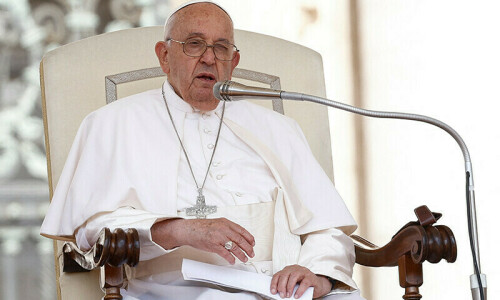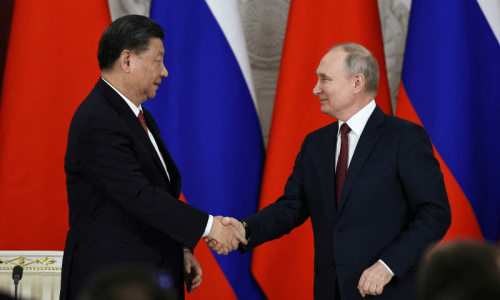PARIS has found itself the unexpected focus of opposition to US plans for a possible war on Iraq by becoming the final hurdle in the Bush administration’s search for a tough UN resolution.
It is an unusual role for France and the fruit, analysts say, of a new, pragmatic approach that aims to repair damaged transatlantic ties while at the same time providing a credible alternative to US ambitions where Paris feels it matters.
“They’ve played it very cleverly,” one diplomat said on Friday. “They’ve cosied up to the US in almost every other area, but on Iraq they’ve stuck to their position and presented it as the only right and proper course. They’ve obliged America to take them seriously.”
Since its election last June, France’s new centre-right government has launched a diplomatic bridge-building exercise aimed at repairing the damage done to relations with Washington by its predecessor.
Remarks like those of the former Socialist foreign minister, Hubert Vedrine, who described America as a “hyper-power”, US foreign policy as “unilateral” and the US president as “simplistic”, have been banished from the French discourse and one US official acknowledged yesterday that relations between the two capitals are “radically improved — like night and day”.
The exception remains the question of what is to be done about Saddam Hussein. The success so far of France’s insistence that disarmament is the only legitimate objective (and that the Iraqi leader’s good faith must at least be tested before sending in the troops) has exasperated state department and Pentagon hawks set on a change of regime in Baghdad.
Ever since George Bush’s speech on Iraq on September 12, France has opposed Washington’s objective of a “tough” UN resolution that would authorise the automatic use of force if President Saddam fails to cooperate fully with weapons inspectors.
Jacques Chirac proposed instead a two-stage process: in the event of Baghdad’s non-compliance, the security council must be reconvened to determine in a second, separate resolution what action — including possible military intervention — should be taken next.
While there were signs on Friday that France may be prepared to accept the new, radically softened US draft, President Jacques Chirac reiterated his stance once again on Friday, saying the world must resist “temptations of adventure” and always make sure “the principle of legitimacy” is observed.
“In the modern world, the use of force should only be a last and exceptional resort,” he said in Beirut. “It should only be allowed in the case of legitimate defence, or by decision of the competent international authorities.”
That position has been backed by Russia and China, fellow veto-holding permanent members of the security council, and was echoed almost unanimously by UN ambassadors in New York this week. Mr Chirac’s efforts have also won the praise of several Arab states.
“Allow me to thank you for France’s remarkable position on the threat of using force to resolve the Iraqi problem,” the speaker of the Lebanese parliament, Nabih Berry, told the French president yesterday. “It is a position that has earned the gratitude of the entire Arab world.” It has not earned the gratitude of the US, but it has at least earned their respect, the French defence minister, Michele Alliot-Marie, said on Friday after a two day visit to Washington.
“We are certainly taken more into consideration now because the US feels that our efforts on defence have made us a credible partner again, and because in the diplomatic arena our attitude — which is supported by a great many countries — makes us a very credible interlocutor.”
France recently announced a 6.1 per cent increase in its 2003 military spending budget to some US dollars 38.8 billion ((pounds sterling)25bn), making it, Ms Alliot-Marie said, “in America’s eyes the only European country besides Great Britain to be making a big financial effort in terms of defence”.
French officials believe it is precisely because Paris has engaged “positively and constructively” on issues as important to Washington as defence spending that it is no longer sidelined as it so often has been in the past.
“Obviously we believe our position on Iraq is right, and we’re reinforced in that view by the support it’s got from other nations,” a senior foreign ministry official said on Friday. “But the work we’ve done in the past six months also means we can no longer be dismissed simply as anti-American.”—Dawn/The Guardian News Service.












































Dear visitor, the comments section is undergoing an overhaul and will return soon.